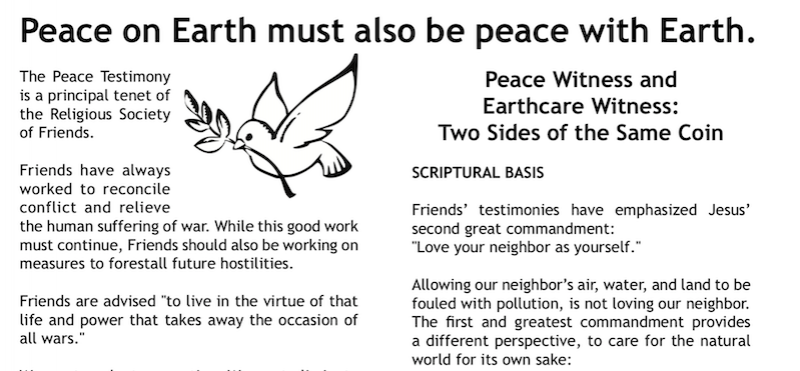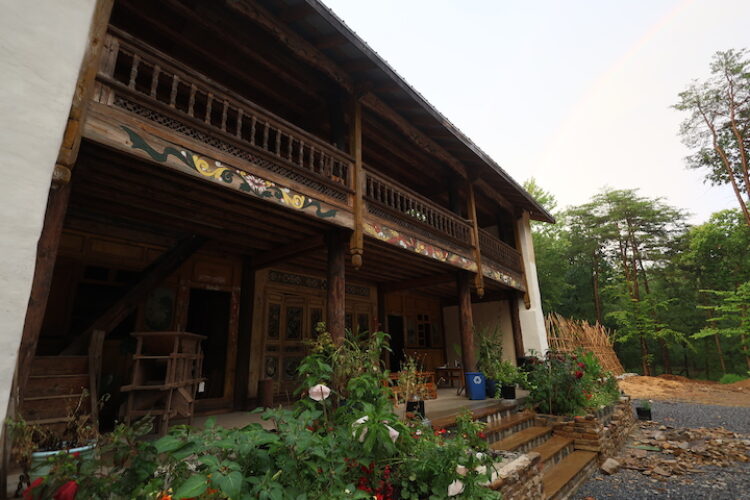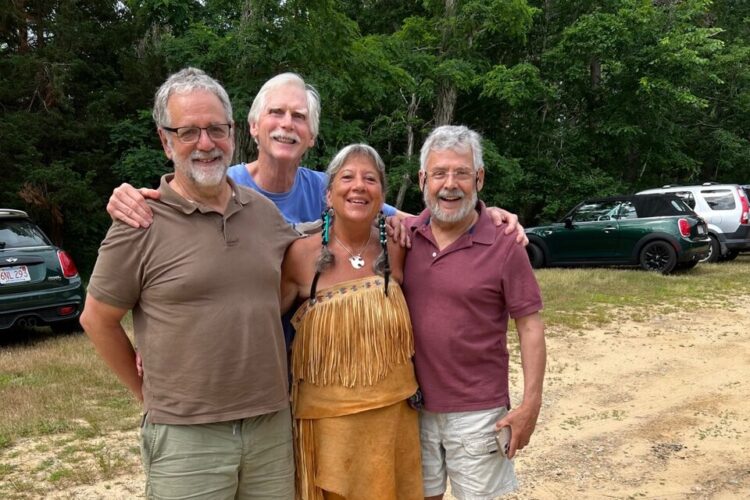Peace on Earth, Peace with Earth

This article is part of our Pamphlets for Sharing series produced by QEW’s Publications Committee. Download the PDF here or order print copies by emailing info@quakerearthcare.org.
The Peace Testimony
The Peace Testimony is a principal tenet of the Religious Society of Friends. Friends have always worked to reconcile conflict and relieve the human suffering of war. While this good work must continue, Friends should also be working on measures to forestall future hostilities.
Friends are advised “to live in the virtue of that life and power that takes away the occasion of all wars.”
We must work at prevention. We must eliminate or reduce those situations which lead to conflict.
As current events have made painfully clear, international tension and violence are due in large part to energy policies, the pressures of expanding human population, disparity in the allocation of resources, and the technologies and economic structures that accelerate these problems. These are the same forces that are degrading our natural environment. In working for world peace, we must address the issues of environmental degradation: overpopulation, energy use, consumption, climate change, species extinction and pollution of the air, water, and land.
Peace witness and Eco-witness: two sides of the same coin
Scriptural basis
Friends’ testimonies have emphasized Jesus’ second great commandment:
“Love your neighbor as yourself.”
Allowing our neighbor’s air, water, and land to be fouled with pollution, is not loving our neighbor.
The first and greatest commandment provides a different perspective, to care for the natural world for its own sake:
“Thou shall love God with your whole heart, your whole mind, and your whole self.”
Psalm 24 tells us:
“The Earth is the Lord’s…”
It follows that to honor the greatest commandment, to love God, is to care for God’s manifestations in the visible world—God’s Creation.
As John Woolman wrote:
I was early convinced… that as the mind was moved on an inward principle to love God as an invisible, incomprehensible being, on the same principle it was moved to love God in all God’s manifestations in the visible world; that… to say we love God as unseen and at the same time exercise cruelty toward the least creature moving by God’s life, or by life derived from God, was a contradiction in itself.
Damage to the Earth is ultimately destructive to human society. Human fossil fuel use, consumption habits, and sheer numbers raise grave concerns.
How much suffering can we tolerate as the changing climate turns arable lands into deserts, spreads tropical diseases, and displaces whole nations?
Where is justice when historic homelands of indigenous people are clear-cut, bulldozed, and exploited for extraction of resources for food, energy, and recreation for the fortunate few?
Can we keep peace if exploding populations compete for scarce water?
It would go a great way to caution and direct people in their use of the world, that they were better studied and known in the creation of it. For how could [they] find the confidence to abuse it, while they should see the great creator stare them in the face, in all and every part thereof?
—William Penn, 1693
Friends working for peace and Friends working for ecological integrity share the same goals: harmony and wholeness in the world’s social order and natural order. As we strive for environmental and social justice, we must address one of the root causes of both human conflict and environmental degradation: social and economic disparity. And we can’t achieve peace without dealing with such global environmental problems as rapid climate change, toxic pollutant buildups, and exponential population growth.
Peace on Earth must also be peace with Earth.
The grass is rich and matted, you cannot see the soil. It holds the rain and the mist, and they seep into the ground, feeding the streams in every gorge. It is well tended, and not too many cattle feed upon it; not too many fires burn it, laying bare the soil. Stand unshod upon it, for the ground is holy, being even as it came from the Creator. Keep it, guard it, care for it, for it keeps people, guards people, cares for people. Destroy it and people are destroyed.
—Alan Paton
Cry, the Beloved Country, 1948
There is urgency. The child born in 1999 who caused our human numbers to reach six billion, will barely reach puberty by the time our numbers reach seven billion. Rapid population growth means human suffering from famine and war over scarce resources. The climate change we are causing is occurring so quickly that few species (including our own) will be able to adapt without great suffering.
Long before the systems of the planet buckle, democracy will disintegrate under the stress of ecological disasters and their social consequences…. It is the poor, precarious, nations of the developing world that would face the threat of totalitarianism first. In many of these countries, where democratic conditions are as fragile as the ecosystem, a reversion to dictatorship will require only a few ecological states of emergency. Their governments will quickly find democracy to be too cumbersome for responding to disruption in food supplies, water sources, and human health—as well as to a floodtide of environmental refugees from homelands that have become incapable of feeding and supporting them.
—Ross Gelbspan, The Heat is On, 1998
War on the environment
Mindless exploitation of Earth’s bounty is not only poor stewardship, it constitutes war on the environment. It upsets the natural harmony; it causes ecological devastation.
Peace on Earth must also be peace with Earth.
Look, this is really simple. The single greatest threat to the national security of the United States is the rapidly deteriorating global environment…. There’s not a chance that the victims of “failed states” and climate change are going to stay where they are. The most massive migrations in history will follow if nothing is done. In your children’s lifetimes.
—Molly Ivins, 2000
Prepared by Quaker Eco-Witness for National Legislation (QNL), a project of Quaker Earthcare Witness.


